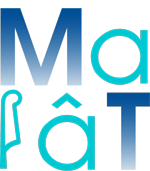Recent studies have shown that the microbiome, the trillions of microorganisms of thousands of different species living on or within our body, plays a key role in educating, regulating, and influencing our immune system, in turn influencing our response to cancer and cancer treatment.
Patients & Healthcare Professionals
We are developing innovative, safe and efficient Microbiome Ecosystem Therapies to address the need of patients living with cancer.
At MaaT Pharma, we believe patients need innovative therapies to fight life-threatening diseases with a focus on cancer.

Healthcare professionals (HCPs)
Research Collaborations and Partnerships
Collaborations are in our DNA. Since day one, we have placed partnering at the core of our drug development strategy — with academic and clinical institutions as well as industry.
Our commitment is to deliver innovative microbiome ecosystem therapies to patients fighting cancer worldwide and we believe in the need to design and conduct clinical research studies with third-party academic and pharmaceutical partners. Therefore, we are open to opportunities of collaborating, primarily in the fields of hemato-oncology and immuno-oncology.
In France, information for compassionate use needs to be submitted via ATU@maat-pharma.com.
If you are interested in collaborating, please contact us at hcp@maat-pharma.com or via the form below:
Hemato-oncology: Hematopoietic Stem Cell Transplantation and Graft-vs-Host-Disease (GvHD)
What is allo-HSCT?
Patients with liquid tumors (such as leukemia or lymphoma) may receive an allogeneic Hematopoietic stem cells transplantation (allo-HSCT) in order to replace their cancerous cells. This is a highly desirable treatment, as it can be curative of the cancer. However, harsh chemotherapy and antibiotic conditioning treatments severely damage the gut microbiome of these patients. Importantly, recent studies have shown that higher microbiome’s richness and diversity are associated with a higher survival rate in patients receiving allo-HSCT, which may be tied to a lower risk of developing graft-vs-host disease and a lower risk of developing infections. It is posited that as the microbiome is a key partner to a functional immune system, a damaged microbiome may result in a dysfunctional immune reaction to the host.
What is Graft-vs-Host Disease?
Acute Graft-versus-Host Disease (aGvHD) occurs in approximately 30-50% of patients receiving allogeneic hematopoietic stem cell transplants (allo-HSCT). In this condition, the transplanted stem cells recognize the recipient’s body as foreign and attack it. This immune response leads to significant inflammation and damage to organs such as the skin, liver, and gastrointestinal (GI) tract, resulting in substantial morbidity and mortality. In its acute form, aGvHD affects approximately 8,500 cases annually in the U.S. and Europe.
GI involvement is associated with severe complications, including profound diarrhea, abdominal pain, intestinal bleeding, and death. These life-threatening complications are challenging to manage due to severe GI inflammation and the associated risks of infection, malnutrition, and organ failure. The most severe (“grade III-IV”) cases have very poor survival expectancy.
The standard first-line therapy for aGvHD is systemic corticosteroids, which work by suppressing the immune response. However, only about 50% of patients respond positively to this treatment. Moreover, the immunosuppressive effects of corticosteroids increase the risk of complications such as infections. If patients do not respond to steroid treatment, they are classified as Steroid-Resistant (SR). In such cases, other agents may be administered.
Currently, the only agent approved for treating SR aGvHD after steroid failure is ruxolitinib. This drug is approved for this indication in the USA and received approval from the European Medical Agency’s Committee for Human Medicinal Products (CHMP) on March 25, 2022.
What does MaaT Pharma develop for these indications?
MaaT Pharma is developing high-richness, high-diversity, standardized Microbiome Ecosystem TherapyTM MaaT013 and MaaT033 dedicated to restoring the microbial ecosystem and normalize the immune response of patients who receive HSCT and those who develop aGvHD:
Immuno-Oncology: Melanoma and Other Solid Tumor Cancers
What are ICIs?
Immune Checkpoint Inhibitors (ICI) are treatments that aim to turn the immune system against cancer cells. While highly effective, these drugs only work for 20-50% of patients depending on the indication. Recent research has suggested that the patients’ gut microbiome diversity and richness, as well as its composition, impacts the response rate and overall survival rate in patients receiving ICI in multiple indications (including melanoma, non-small cell lung cancer, renal cell carcinoma, …).
What does MaaT Pharma develop in immuno-oncology?
MaaT Pharma is developing a new range of co-cultured oral Microbiome Ecosystem Therapies (MaaT03X) and will be launching a series of clinical trials dedicated to leveraging on the restoration of the microbiome to ensure the patient is sensitive to ICI treatments. This will be made by restoring key functional networks.
Frequently Asked Questions
What's the microbiota? What's the microbiome?
The “microbiota” is the assemblage of microorganisms (all the bacteria, archaea, eukaryotes, and viruses) present in a defined environment.” More specifically, the microbiota varies according to its surrounding environment. For example, ‘gut microbiota’ refers to the microbiota in the intestinal tract.” The microbiome is the genetic potential of the Microbiota and is defined as “the entire habitat, including the microorganisms (bacteria, archaea, lower and higher eukaryotes, and viruses), their genes, and the surrounding environmental conditions.”
What are gut microbiota richness and diversity?
Richness refers to the total number of bacteria present in the gut microbiota. Diversity refers to the number of different species in the gut microbiota. Both can be estimated using specific ecological indexes derived from the number of genes observed with high throughput sequencing methods. High levels of richness and diversity have been associated with a healthy microbiome.
What is gut dysbiosis?
Gut dysbiosis is a break of the dialogue between the host and the gut microbiota. Notably, dysbiosis is understood as the opposite of symbiosis, i.e. the healthy interplay between the gut microbiome and the host. At MaaT Pharma, we are especially interested in the relationship between the microbiota and the immune system of the host, and how dysbiotic states may impair the immune response and negatively impact cancer patients’ clinical outcomes.
What are MaaT Pharma’s Microbiome Ecosystem Therapies?
MaaT Pharma’s Microbiome Ecosystem Therapies (MET) are therapeutic candidates designed to harness the potential of a complete microbiome ecosystem to achieve maximum clinical benefit (ie: not a reductionist approached).
The company has developed the first global platform for the development and manufacturing of MET-N, donor-derived candidates designed to restore symbiosis in patients experiencing severe, often treatment-induced dysbiosis in the context of acute diseases.
MaaT Pharma has also developed MET-C, a groundbreaking platform that combines its AI-powered gutPrint® technology with ecological indexes to identify innovative candidates. This unique approach, supported by advanced co-cultivation (ie: donor independant) capabilities, targets non-treatment-induced dysbiosis, particularly in immunotherapies like immune checkpoint inhibitors (ICIs) used for solid tumors.
How do MaaT Pharma’s Microbiome Ecosystem Therapies approach differ from other live biotherapeutic products approaches (e.g. single-strain bacteria or consortia of bacteria)?
The gut microbiota is a complex ecosystem, where billions of live microorganisms, particularly bacteria, form functional relationships among themselves and with their host. MaaT Pharma’s core scientific hypothesis is that bacterial richness, diversity, and functional networks are the three key drivers of the microbiome’s functionality and critical to triggering clinical responses, as extensively supported by literature. Richness and diversity provide the foundation upon which specific functional networks perform essential physiological activities.
This hypothesis underpins MaaT Pharma’s development of Microbiome Ecosystem Therapies (MET): comprehensive ecosystems designed to restore symbiosis or modulate specific pathways and functions. Alternative approaches, such as single-strain or bacterial consortia (comprising 2 to a few dozen strains), are theoretically less complex and may offer clearer mechanistic insights. However, they have demonstrated limited success in late-stage trials and have not overcome the regulatory challenges inherent to any emerging therapeutic field.
MaaT Pharma firmly believes that the most effective way to achieve clinical benefit is by mimicking natural ecosystems. Full microbiome ecosystems, whether donor-derived or co-cultivated, provide the complexity and functionality required to address unmet clinical needs and restore host-microbiota symbiosis
How do MaaT Pharma’s MET product candidates differ from fecal microbiota transfer (FMT), in terms of quality, regulatory etc…?
Both MET product candidates and Fecal Microbiota Transplantation (FMT) aim to administer product or preparation manufactured from human stool microbiota to restore a healthy gut microbiota in cases of dysbiosis. MET products are drugs that represent the most stringent regulatory status among health products therefore ensuring the highest level of safety for patients.
They are manufactured in Good Manufacturing Practices (GMP) centralized facilities ensuring manufacturing process consistency, batch reproductibility and final product standardization.
MET products are evaluated/assessed reviewed and regulated by drug agencies which also includes having received IND/CTA authorization from National Competent Authorities.
MET product are controlled for quality, safety, and efficacy all along the drug manufacturing process and up to the patients’ administration.
In contrast, Fecal Microbiota Transplantation (FMT) usually refers to preparations’ products sometimes derived from biobanks, mostly prepared and administered within the same hospitals. FMT involves transferring a donor’s stool—often homogenized—into the intestinal tract of a recipient.
FMT involves transferring a donor’s stool derived from a single donor directly to patients without standardization nor characterization. FMT preparations are generally prepared at the point of care and are not complying with drug regulatory requirements. Consequently, FMT lacks standardization in terms of reproducibility for efficacy (potency), quality and safety (purity), both within a single hospital or biobank and across different hospitals or biobanks.
What is Early Access Program?
The Early Access Program (EAP) was launched by MaaT Pharma in 2019. This program is designed to provide access to treatments for patients with severe or life-threatening conditions who have no other therapeutic options available. Eligibility for the program is strictly determined, and in most countries, access requests must be authorized by the National Competent Authority and/or local ethics committee.
As of today, the program has received authorizations across 10 countries, including the United States under FDA oversight in December 2024. The Company is also publishing data regularly on patients treated under the Early Access Program such as the latest presentation at ASH 2024 Annual Meeting.

